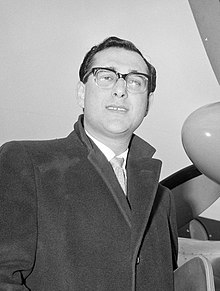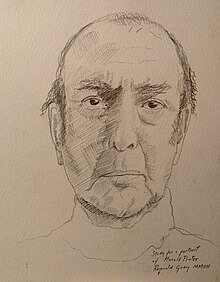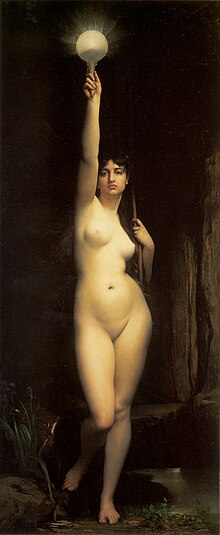Harold Pinter
Appearance



Harold Pinter (10 October 1930 – 24 December 2008) was a British playwright, actor and theatre director. He was awarded the Nobel Prize in Literature in 2005.
Quotes
[edit]


If such a determination is not embodied in our political vision we have no hope of restoring what is so nearly lost to us — the dignity of man.
- If only I could get down to Sidcup! I've been waiting for the weather to break. He's got my papers, this man I left them with, it's got it all down there, I could prove everything.
- The Caretaker (1960), act 1
- Apart from the known and the unknown, what else is there?
- The Homecoming (1965), act 2, sc. 1
- The weasel under the cocktail cabinet.
- On his subject-matter. Quoted in J. Russell Taylor, Anger and After (1962)
- I tend to believe that cricket is the greatest thing that God ever created on earth. [...] Certainly greater than sex, although sex isn't too bad either.
- From an interview with Miriam Gross, as cited in "Pinter on Pinter", The Observer (5 October 1980), p. 27
- Sandinistas are a democratically elected government which originally led a popular revolution to overthrow a dictatorship based on slavery. ...
US foreign policy could be best defined as follows: kiss my arse or I'll kick your head in. It is as simple and as crude as that. It can hardly be said to be a complicated foreign policy. What is interesting about it is that it is so incredibly successful. It possesses the structures of disinformation, use of rhetoric, distortion of language, which are very persuasive, but are actually a pack of lies. It is very successful propaganda. They have the money, they have the technology, they have all the means to get away with it, and they do. I find the ignorance in this country, Britain, and certainly the US, really quite deep. It is not only the Republican Party and government in the US which are responsible for this state of affairs, but I see the Democrats as only differing by degrees. While they say "no more military aid to the Contras"… they are still referring to an innate and deeply embedded assumption that they are talking about a Marxist-Leninist totalitarian dictatorship; gangsters, thugs, instructed from Moscow.- Quoted in an interview, conducted by Andrew Graham-Yooll, South Magazine (May 1988)
- I suggest that US foreign policy can still be defined as "kiss my ass or I'll kick your head in." But of course it doesn't put it like that. It talks of "low intensity conflict..."
What all this adds up to is a disease at the very centre of language, so that language becomes a permanent masquerade, a tapestry of lies.- "Oh, Superman", Opinion (Channel 4, 31 May 1990), reprinted in Various Voices: Prose, Poetry, Politics 1948-2005, rev. ed. (1998; London: Faber and Faber, 2005), p. 198-99.
- Praise the Lord for all good things.
We blew their balls into shards of dust,
Into shards of fucking dust.
We did it.
Now I want you to come over here and kiss me on the mouth.- From "American Football" (1991), quoted on 329 of Michael Billington's official authorized biography, Harold Pinter, rev. ed. of The Life and Work of Harold Pinter (1996; Faber and Faber, 2007).
- In Cuba I have always understood harsh treatment of dissenting voices as stemming from a "siege situation" imposed upon it from outside. And I believe that to a certain extent that is true.
- "Caribbean Cold War", Red Pepper (May 1996).
- I believe his arrest and detention by the international criminal tribunal is unconstitutional, and goes against Yugoslav and international law. They have no right to try him.
- On the arrest of Slobodan Milošević, as quoted by Fiachra Gibbons, in "Free Milosevic, says Pinter", The Guardian (26 July 2001).
- The atrocity in New York was predictable and inevitable. It was an act of retaliation against constant and systematic manifestations of state terrorism on the part of the United States over many years, in all parts of the world.
I believe that it will do this not only to take control of Iraqi oil, but also because the American administration is now a blood-thirsty wild animal.- Referring to the 9/11 attacks, in "The American administration is a bloodthirsty wild animal", The Telegraph (12 November 2002), published version of speech made upon accepting an honorary doctorate from University of Turin in 2002.
- The U.S. is really beyond reason now. It is beyond our imagining to know what they are going to do next and what they are prepared to do. There is only one comparison: Nazi Germany... Nazi Germany wanted total domination of Europe and they nearly did it. The U.S. wants total domination of the world and is about to consolidate that...
Blair sees himself as a representative of moral rectitude. He is actually a mass murderer. But we forget that — we are as much victims of delusions as Americans are.- Speech at the National Theatre, London (10 June 2003), as quoted by Angelique Chrisafis and Imogen Tilden, in "Pinter Blasts 'Nazi America' and 'deluded idiot' Blair", The Guardian (11 June 2003).
- The government of the US has no moral authority to elect itself as the judge over human rights in Cuba, where there has not been a single case of disappearance, torture or extra-judicial execution since 1959, and where despite the economic blockade, there are levels of health, education and culture that are internationally recognised.
- Harold Pinter, et al. "Letters: Human Rights and Cuba", The Guardian (26 March 2005). Pinter was a signatory.
- I saw Len Hutton in his prime,
Another time, another time.- Poem A Cricket Poem, quoted in Wisden Cricketers' Almanack 2009, p. 1604
Writing for the Theatre (1962)
[edit]- Speech made by Harold Pinter to the National Student Drama Festival, in Bristol in 1962. Reprinted as "Introduction: Writing for the Theatre", on 9–16 of Complete Works: One (New York: Grove Press [Black Cat Ed.], 1977). ISBN 0802140882. Rpt. by Grove/Atlantic, Inc. in 1994. ISBN 0802150969. ISBN 9780802150967. Also rpt. as "Writing for the Theatre" on 20–26 of Various Voices: Prose, Poetry, Politics: 1948—2005, rev. ed. (1998; London: Faber and Faber, 2005). ISBN 0571230091. ISBN 9780571230099.
- There are no hard distinctions between what is real and what is unreal, nor between what is true and what is false. A thing is not necessarily either true or false; it can be both true and false. (p. 11)
- So often, below the word spoken, is the thing known and unspoken. My characters tell me so much and no more, with reference to their experience, their aspirations, their motives, their history. Between my lack of biographical data about them and the ambiguity of what they say lies a territory which is not only worthy of exploration but which it is compulsory to explore. (p. 13)
- The speech we hear is an indication of that which we don't hear. It is a necessary avoidance, a violent, sly, and anguished or mocking smoke screen which keeps the other in its true place. When true silence falls we are left with echo but are nearer nakedness. One way of looking at speech is to say that it is a constant stratagem to cover nakedness. (p. 14)
- We have heard many times that tired, grimy phrase: 'Failure of communication...' and this phrase has been fixed to my work quite consistently. I believe the contrary. I think that we communicate only too well, in our silence, in what is unsaid, and that what takes place is a continual evasion, desperate rear-guard attempts to keep ourselves to ourselves. Communication is too alarming. To enter into someone else's life is too frightening. To disclose the poverty within us is too fearsome a possibility. (15)
- Each play was, for me, 'a different kind of failure.' And that fact, I suppose, sent me on to write the next one. (p. 15)
- Ellipses in the version published in Various Voices omit quotation listed first above, which is featured on the home page of Pinter's official Website, HaroldPinter.org, and also quoted in his 2005 Nobel Lecture (see next section). Beginning with quoting these words that he says he wrote "in 1958", he adds the following qualification: "I believe that these assertions still make sense and do still apply to the exploration of reality through art. So as a writer I stand by them but as a citizen I cannot. As a citizen I must ask: What is true? What is false?"
Art, Truth & Politics (2005)
[edit]- Nobel lecture (7 December 2005)
- "But the real truth is that there never is any such thing as one truth to be found in dramatic art. There are many. These truths challenge each other, recoil from each other, reflect each other, ignore each other, tease each other, are blind to each other. Sometimes you feel you have the truth of a moment in your hand, then it slips through your fingers and is lost."
- It's a strange moment, the moment of creating characters who up to that moment have had no existence. What follows is fitful, uncertain, even hallucinatory, although sometimes it can be an unstoppable avalanche. The author's position is an odd one. In a sense he is not welcomed by his characters. They resist him, they are not easy to live with.
- A writer's life is a highly vulnerable, almost naked activity. We don't have to weep about that. The writer makes his choice and is stuck with it. But it is true to say that you are open to all the winds, some of them icy indeed. You are out on your own, out on a limb. You find no shelter, no protection — unless you lie — in which case of course you have constructed your own protection and, it could be argued, become a politician.
- The invasion of Iraq was a bandit act, an act of blatant state terrorism, demonstrating absolute contempt for the concept of international law. The invasion was an arbitrary military action inspired by a series of lies upon lies and gross manipulation of the media and therefore of the public; an act intended to consolidate American military and economic control of the Middle East masquerading — as a last resort — all other justifications having failed to justify themselves — as liberation.
- When we look into a mirror we think the image that confronts us is accurate. But move a millimetre and the image changes. We are actually looking at a never-ending range of reflections. But sometimes a writer has to smash the mirror — for it is on the other side of that mirror that the truth stares at us.
I believe that despite the enormous odds which exist, unflinching, unswerving, fierce intellectual determination, as citizens, to define the real truth of our lives and our societies is a crucial obligation which devolves upon us all. It is in fact mandatory.
If such a determination is not embodied in our political vision we have no hope of restoring what is so nearly lost to us — the dignity of man.
- The crimes of the United States have been systematic, constant, vicious, remorseless, but very few people have actually talked about them. You have to hand it to America. It has exercised a quite clinical manipulation of power worldwide while masquerading as a force for universal good. It’s a brilliant, even witty, highly successful act of hypnosis.
- Language is actually employed to keep thought at bay. The words ‘the American people’ provide a truly voluptuous cushion of reassurance. You don’t need to think. Just lie back on the cushion. The cushion may be suffocating your intelligence and your critical faculties but it’s very comfortable.
Quotes about Pinter
[edit]- In his Nobel Prize acceptance speech last year, laureate Harold Pinter said 'a writer's life is a highly vulnerable, almost naked activity. We don't have to weep about that. But it is true to say that you are open to all the winds, some of them icy indeed.'
- Nadine Gordimer "Faith, Reason and War" (2006)
External links
[edit]- HaroldPinter.org – The Official Website for the International Playwright Harold Pinter (much of Pinter's work available here for free viewing online.)
Categories:
- 1930 births
- 2008 deaths
- Actors from England
- Theatre directors
- Activists from England
- Jews from the United Kingdom
- Playwrights from England
- Screenwriters from England
- Poets from England
- Recipients of the Franz Kafka Prize
- Nobel laureates in Literature
- Socialists from England
- Anti-war activists
- Free speech activists
- Anti-apartheid activists
- Human rights activists
- Atheists from England
- People from London
- Tony Award winners
- Nobel laureates from England
- Short story writers from England
- Essayists from England
- Literary critics
- Film directors from England
- Pacifists
- Cultural critics
- Anti-nuclear weapons activists
- Social critics
- Fellows of the Royal Society of Literature
- Laurence Olivier Award winners

